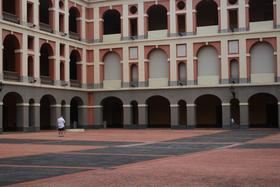Serving 589 students in grades Kindergarten-8, Aurora Quest K-8 ranks in the top 1% of all schools in Colorado for overall test scores (math proficiency is top 1%, and reading proficiency is top 1%).
The percentage of students achieving proficiency in math is 82% (which is higher than the Colorado state average of 32%). The percentage of students achieving proficiency in reading/language arts is 88% (which is higher than the Colorado state average of 45%).
The student:teacher ratio of 20:1 is higher than the Colorado state level of 16:1.
Minority enrollment is 61% of the student body (majority Black and Hispanic), which is higher than the Colorado state average of 49% (majority Hispanic).
Quick Stats (2024-25)
- School Type: Magnet School
- Grades: Kindergarten-8
- Enrollment: 589 students
- Student:Teacher Ratio: 20:1
- Minority Enrollment: 61%
- Overall Testing Rank: Top 1% in CO
- Math Proficiency: 82% (Top 1%)
- Reading Proficiency: 88% (Top 1%)
- Science Proficiency: 60-69% (Top 5%)
- Source: National Center for Education Statistics (NCES), CO Dept. of Education
Top Rankings
Aurora Quest K-8 ranks among the top 20% of public schools in Colorado for:
Category
Attribute
Overall Rank
Math Proficiency
Reading/Language Arts Proficiency
Science Proficiency
Diversity
School Overview
Aurora Quest K-8's student population of 589 students has stayed relatively flat over five school years.
The teacher population of 29 teachers has stayed relatively flat over five school years.
School Type
Grades Offered
Grades Kindergarten-8
Total Students
589 students

Gender %

Total Classroom Teachers
29 teachers

Students by Grade

School Calendar
School Rankings
Aurora Quest K-8 ranks within the top 1% of all 1,779 schools in Colorado (based off of combined math and reading proficiency testing data).
The diversity score of Aurora Quest K-8 is 0.75, which is more than the diversity score at state average of 0.62. The school's diversity has stayed relatively flat over five school years.
Overall Testing Rank
#8 out of 1779 schools
(Top 1%)
(Top 1%)

Math Test Scores (% Proficient)
82%
32%

Reading/Language Arts Test Scores (% Proficient)
88%
45%

Science Test Scores (% Proficient)
(20-21)60-69%
29%
Student : Teacher Ratio
20:1
16:1

American Indian
n/a
1%

Asian
9%
3%

Hispanic
20%
35%

Black
22%
5%

White
39%
51%

Hawaiian
n/a
n/a
Two or more races
10%
5%

All Ethnic Groups



Eligible for Free Lunch
36%
33%

Eligible for Reduced Lunch
5%
7%

School Statewide Testing
School District Name
Source: National Center for Education Statistics (NCES), CO Dept. of Education
Frequently Asked Questions
What is Aurora Quest K-8's ranking?
Aurora Quest K-8 is ranked #8 out of 1,779 schools, which ranks it among the top 1% of public schools in Colorado.
What percent of students have achieved state testing proficiency in math and reading?
82% of students have achieved math proficiency (compared to the 32% CO state average), while 88% of students have achieved reading proficiency (compared to the 45% CO state average).
How many students attend Aurora Quest K-8?
589 students attend Aurora Quest K-8.
What is the racial composition of the student body?
39% of Aurora Quest K-8 students are White, 22% of students are Black, 20% of students are Hispanic, 10% of students are Two or more races, and 9% of students are Asian.
What is the student:teacher ratio of Aurora Quest K-8?
Aurora Quest K-8 has a student ration of 20:1, which is higher than the Colorado state average of 16:1.
What grades does Aurora Quest K-8 offer ?
Aurora Quest K-8 offers enrollment in grades Kindergarten-8
What school district is Aurora Quest K-8 part of?
Aurora Quest K-8 is part of Aurora Joint District No. 28 Of The Counties Of Adams And A School District.
In what neighborhood is Aurora Quest K-8 located?
Aurora Quest K-8 is located in the Aurora Hills neighborhood of Aurora, CO. There are 3 other public schools located in Aurora Hills.
School Reviews
5 2/28/2012
We absolutely LOVE Aurora Quest K8!
I have two boys at Aurora Quest Academy and we have been part of the school for over three years.
My boys look forward to going to school each and every day and we as parents are happy that they are challenged every day. A great aspect of the school is that our kids are allowed tojust be kids. In the four years at this school, I have never felt like my children have been labeled as "gifted", but rather they are looked at as kids. Academically, the curriculum is geared towards how GT students learn best, but my kids still are not aware they are GT. It's not that I think the label is bad, I just don't think it's important and that also seems to be the atmosphere of the school. Both my boys have very little homework and because of this, my kids have the opportunity to explore their own interests and we have time to be a family. Another one of my favorite aspects of the school is that every day my eldest son comes home and tells me about the fun imaginary games he plays at recess everyday with his friends. He's almost 9 and because of the atmosphere at this school he's not forced to grow up to fast. He is allowed to be himself. The detailed and complex imaginary games he plays with his friends teach him leadership skills and allow him an outlet for his creativity. The games these kids play could be made into a movie and I look forward to hearing about their storyline. My younger son has a unique personality and sometimes expresses his creativity in unique ways. This has never been a problem at this school. His differences are excepted and he's never stared at or teased for being different. Having the freedom has given both my sons the confidence to be themselves and excel both academically and socially. The teachers my boys have had at Quest have all been amazing teachers who support and give my children the freedom to be unique. This atmosphere of support and acceptance of individuality allows my children the freedom to have a healthy sense of self.
Not only is this school give my children the freedom to be individuals, it also has been proven to grow their minds academically. I'm not talking about CSAP scores either. Having a student body of GT and advanced learners, it's no surprise we have high CSAP scores, but our children are also showing high growth from year to year academically.
The only negative I have to complain about is that I wish the Principal was more present in the school. My son's don't really know her and I find it very sad. I asked my son if he knew her name and he thought the Dean was the Principal. The Vice Principal is definitely more present and is very involved with the students. He is very approachable and just in general a very nice man. My kids absolutely love him and so do we!
If you have a GT kid who seems to not quite fit in, this is the place where uniqueness and individuality are supported and grown!
Review Aurora Quest K-8. Reviews should be a few sentences in length. Please include any comments on:
- Quality of academic programs, teachers, and facilities
- Availability of music, art, sports and other extracurricular activities
Recent Articles

How Does Bullying Affect a Student’s Academic Performance?
We explore the significant impact of bullying on students' academic performance, discussing statistics, research findings, and long-term effects. It provides valuable insights for educators and parents on recognizing bullying behaviors and implementing effective prevention strategies to create a safe learning environment.

Can Students Be Legally Prosecuted for School Fights?
This comprehensive guide explores the increasing trend of legal prosecution for school fights, discussing recent incidents, age considerations, and the shift from traditional school punishments to law enforcement involvement. It provides valuable insights for parents, educators, and students about the evolving landscape of school discipline and safety measures.

Understanding Rubrics
This article explores the fundamental principles of rubrics in education, focusing on their role as assessment tools. It breaks down the key components of rubrics, including criteria, performance levels, and descriptors. The piece also delves into the two main types of rubrics - holistic and analytic - providing authoritative definitions and explaining their unique applications in educational settings.









